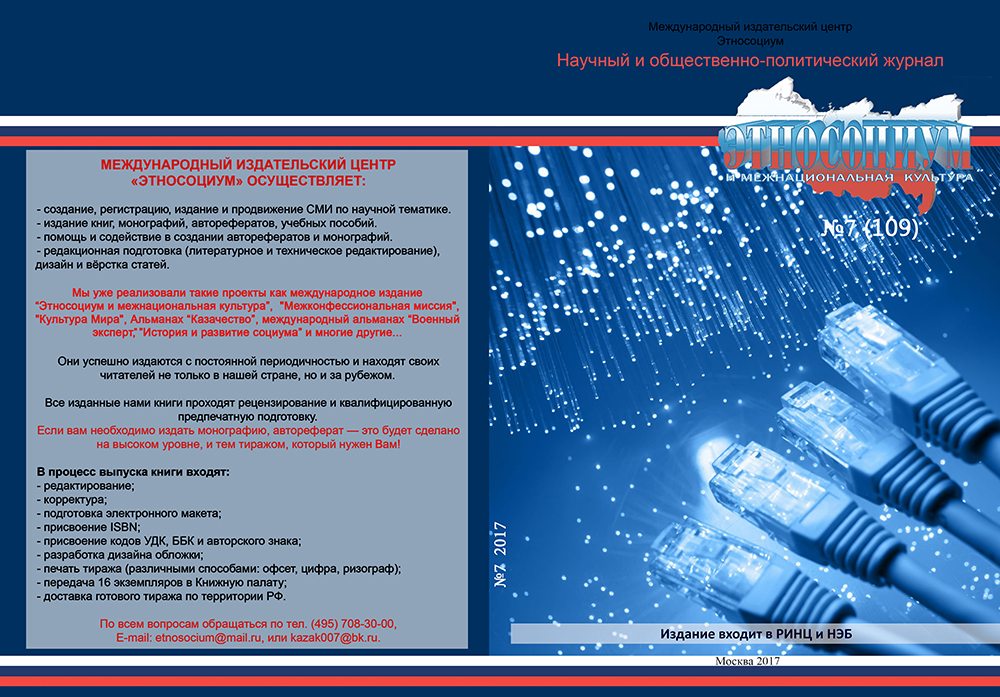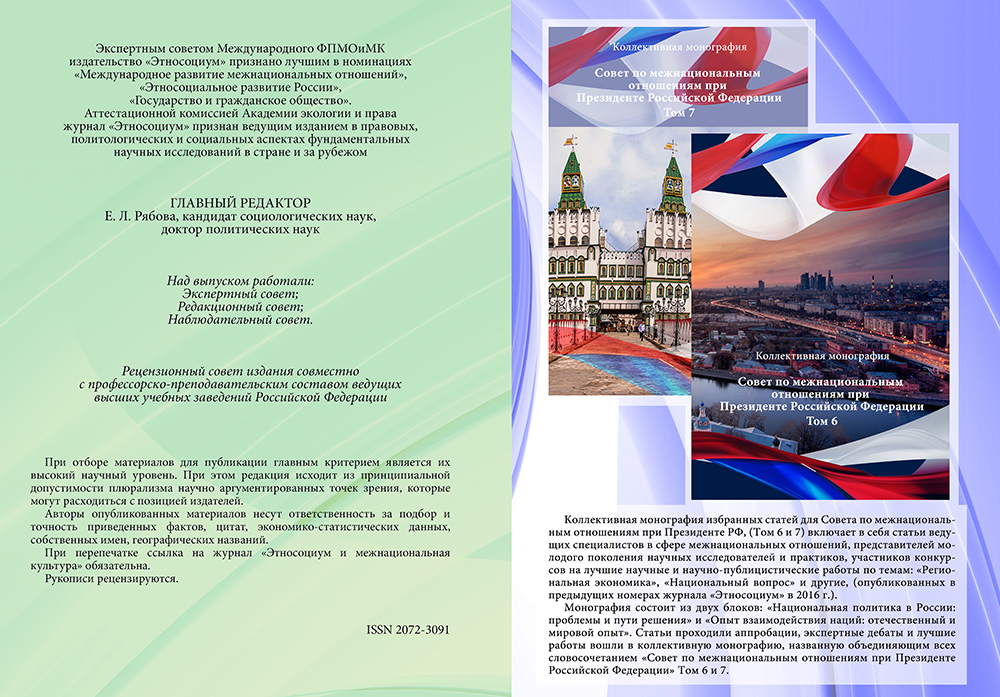

Content
|
COUNCIL OF INTERNATIONAL RELATIONSHIP
|
|
|
Biryukov S.V. Regional system of Russia: the logic of decentralization
|
9
|
|
Androsova I.G., Strizhova E.V. Specific features of political and psychological manipulation object in modern Russia
|
21
|
|
POLITICS, ECONOMICS, LAW:
ACTUAL PROBLEMS OF MODERN SOCIETY
|
|
|
Bessonov E.G. Socio-philosophical analysis of algorithms and internal logic of development of social systems
|
28
|
|
Buyanov V.S. The ideological foundations of Russia's spiritual security
|
40
|
|
Nikitin E.D. Popularization of Soil Science as an Actual Philosophical-Scientific and Cultural Problem
|
52
|
|
Shkurova P.D. Comparative legal analysis of the norms on written evidence in the civil and administrative proceedings of Russia and the former Soviet Union republics
|
63
|
|
POLITICS, ECONOMICS, LAW:
REGIONAL STUDY
|
|
|
Information about the Bashkir Institute of Social Technologies
|
75
|
|
Nigmatullina T.A. Various directions of youth movement: chalenges of time
|
79
|
|
Dzutsev K.V. Rating of authorities, political parties and politicians in the Republic of North Ossetia-Alania of the Russian Federation
|
90
|
|
Rahimova M.V. Biological Background of Human Future Or Second Code’s Impact On Human Textuality
|
95
|
|
Siryukova Y.A. External risks and challenges for the formation of civil identity
|
107
|
|
Luchkovskiy R.N. The features and capabilities of strategic development of agricultural production – regional level
|
117
|
|
INTERNATIONAL RELATIONSHIPS:
POLITICS, ECONOMICS, LAW
|
|
|
Komleva V.V. Consolidation of interactions in the humanitarian sphere
|
124
|
|
Mikhaylenko A.N. Russian foreign policy in conditions of the world uncertainty
|
132
|
|
Morozov V.M., Nosenko T.V., Krylov A.V. Dynamics of the conflict between Israel and Hamas organization in 2014–2016
|
143
|
|
Ananchenkova P.I., Kuznecov M.Y. Travel image (for example Azerbaijan)
|
152
|
|
IV International Scientific Conference. "Russia and China: Applied Aspects of Ensuring the Development Process of Society"
|
158
|
|
Abstract
|
166
|
|
Authors
|
175
|
|
Requirements to materials submitted to the international publishing house "Etnosocium"
|
179
|
The article describes the historical specificity of the regional system of Russia and its modern state. The author analyzes the efficiency and the effectiveness of the regional policy of modern Russia. The article substantiates the necessity of transition to managed economic decentralization on the basis of interregional associations of economic cooperation.
Keywords: regional system, regional policy, regional strategy, regional development, decentralization, interregional associations.
The article reviews such key notions of political science as hard (force and economic) and soft power (psychological and informational) technologies. The author researches the process of political and psychological manipulation (PPM) and explores the features of PPM object in modernizing Russia.
Keywords: hard force, economic, soft power, psychological, informational, technologies, political, psychological manipulation, subject, PPM, object.
The article considers approaches to the development of social systems based on the information state of society. Socio-philosophical substantiation of algorithms and logic of social behavior is offered. Historical analogies are being made, revealing the difference and similarity between existing holistic ideas about the world. The problem of distinguishing the internal logic of social behavior for the further crisis-free development of the information society is posed.
Keywords: Information society, world view, algorithm, cyberspace, social development, globalization.
The content and ways of solving the problem of popularizing soil science as an important mechanism for enhancing its development and strengthening are analyzed. Polyaspectivity of this important task is shown. Intradisciplinary, interdisciplinary popularization, as well as the popularization of soil science in the educational and cultural space, are characterized. An apparent discrepancy between the high objective relevance of soil science for science and practice and the mediocre level of its perception and evaluation by the educated part of society is established, which negatively affects the development, teaching of soil disciplines, real practice of using and protecting soil resources.
Keywords: popularization, museum, soil science, soil protection, geobionoosphere, soil ecology.
In this article, the author analyzes and compares the civil procedural legislation on the question of written evidence in the former Soviet Union republics with the relevant provisions of the Civil Procedural Code of the Russian Federation, the AIC of the RF and the CAS of the RF. The author notes a significant coincidence of many norms of civil procedural legislation in these countries. The conducted analysis will make it possible to draw conclusions about the need for borrowing the most rational norms from foreign codes in the CCP of the RF, the agrarian and industrial complex of the Russian Federation, the CAS of the Russian Federation, and in the future into a single CCP of the Russian Federation.
Keywords: civil proceedings, administrative proceedings, civil process of foreign countries, written evidence.
The reasons are considered in the article - reasons of activation of youth protest behavior in modern Russia, influence of new forms of public communication on development of the personality and socialization of rising generation; Technologies of formation of political culture and civil-law literacy in children's and youth environment are offered.
Keywords: youth, protest behavior, media sources, social networks, suicidal trial, ideology, political culture, and civil-legal education.
From June 23 to July 7 this year. The North Ossetian Department of Social Studies of the Institute of Social and Political Studies of the Russian Academy of Sciences and the Department of Sociology of the North Ossetian State University named after. K.L. Khetagurov conducted an expert poll on the rating of authorities, political parties and politicians of the Republic of North Ossetia-Alania. 75 experts were interviewed, among them journalists, scientists, officials, members of political parties, cultural workers, entrepreneurs, representatives of various denominations, lawyers and residents permanently residing in the territory of the republic.
Keywords: budget, economy, trust, oligarchs, police, judicial system, highly moral people, public opinion, political parties.
In this article the author elaborates on similarities and differences of a genome and text, language, script or library. It appears that such elaboration would help explain and describe genetically driven biochemical processes, and would invite an assumption of potential textuality of a human being.
Independently the author explores the idea of a second or epigenetic code that is in charge for the autonomy and identity of each cell, and for the cellular memory (epigenetic programs, epigenetic keys).
Additionally the author contemplates on issues of biological determinants of a life of a person, in author’s view to a great extent controlled through influence of the second code that in its turn is dependent on external factors.
Keywords: biological background of the future, second code, textuality, genome, epigenome, epigenetic landscape.
In today's Russia, external threats and risks, manifested in globalization processes and the rapid growth of the role of information technologies in the information society, and their negative impact on national states, pose a certain risk for the formation and general civil identity. This is the focus of the author's attention in this article. The author pays special attention to the changes that the information society assumes and the countermeasures that the state and civil society institutions must develop in connection with information attacks on state sovereignty and its values, which ultimately may affect the formation and perception of civil identity.
Keywords: civic identity, globalization, media wars, information society, external risks, Russian Federation, information policy, global issues, identity.
In the article on the example of a particular region considers the outcomes of strategic development of agrarian sector of economy. Systematization of the causes and factors that determine the dynamics of its development in the future.
Keywords: the results of the strategic development of the implemented model, the factors and reasons for the strategic lag.
Russia’s goal in its foreign policy is to ensure security, stability and sustainable development in our country and throughout the world. However, in recent decades, the world is far from stable, and the trend towards uncertainty in international relations is growing. Analysis of foreign countries’ experience shows that in various forms they try to resolve this contradiction between the desired and real states of world politics. Innovation and creativity of the country's foreign policy present a response to uncertainty in the world. A range of measures aimed at increasing innovativeness and creativity of Russian foreign policy are suggested in the article.
Keywords: diplomacy, stability, uncertainty, VUCA, creativity, innovativeness, Ch. Duguin-Clement, I. Manor.
Standoff between the State of Israel and the radical organization HAMAS is part of the Palestinian-Israeli and Arab-Israeli conflicts. The establishment of control of HAMAS over the Gaza Strip has augmented this standoff. The author considers the events of 2014-2016 in the Palestinian arena. In 2014, Israel conducted the operations of significant scale. Potential of escalation of the conflict between Israelis and Palestinians is persisting currently. Situation in military sphere and socio-economic situation in the Gaza Strip are conditioning potential of escalation of the conflict in the Palestinian arena. Socio-economic situation in the Gaza Strip generated the levers for de-escalation of the conflict. The author pays attention to possible Israeli conquest of the Gaza Strip. Significant reduction of potential of escalation of the conflict between Israelis and Palestinians is urgent and difficult task for international community. Now even «routine» outbreaks of tension in zone of the standoff are requiring close attention.
Keywords: Palestinian-Israeli conflict, the State of Israel, HAMAS, «Islamic Jihad», the Gaza Strip, operation «Protective Edge», potential of escalation of the conflict.
For the last years, the development of tourism in the Russian Federation has largely depended on negative social-economic and political factors. The world economic crisis, the growth of dollar and euro exchange rate, the closure of tourist routes in the directions which are the most popular among the Russians (Turkey and Egypt) and the tightening of the visa regime in the Schengen area have shifted the popularity accents of the far abroad by increasing the demand for tourist destinations in the countries of the former USSR. Azerbaijan is one of those countries whose tourist attraction to Russian travelers is growing from year to year, and more and more people want to visit the Country of the Lights, to see, with their eyes, the activity results of the ancient pagans, Zoroastrians, Muslims.
The article discloses the main features of the image formed by the Republic of Azerbaijan, which provide a positive and negative perception of the country as a tourist destination. The work gives the statistical data reflecting the dynamics of tourist travels to the CIS countries, including Azerbaijan, Word statistics analyses the search requests on the Internet, in one or another combination demonstrating the user interest in the country. A quantitative analysis of the tourism infrastructure, accommodation facilities (traditional and alternative), excursion services, car rental is made. There are comments from tourists about the Republic, individual cities as well as security ratings of the country, formed by the global organization International SOS.
Keywords: Information, image, destination, stats, reviews.